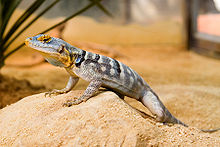California rock lizard
This article needs additional citations for verification. (December 2009) |
| California rock lizards - Petrosaurus | |
|---|---|
 | |
| Baja blue rock lizard | |
| Scientific classification | |
| Domain: | Eukaryota |
| Kingdom: | Animalia |
| Phylum: | Chordata |
| Class: | Reptilia |
| Order: | Squamata |
| Suborder: | Iguania |
| Family: | Phrynosomatidae |
| Genus: | Petrosaurus Boulenger, 1885[1] |
| Species | |
| See text | |
The California rock lizards are a genus (Petrosaurus) of New World lizards in the family Phrynosomatidae.[2]
Geographic range
[edit]They are endemic to southern California, United States, and Baja California and Baja California Sur, Mexico.[3]
Habitat
[edit]This lizard species lives almost exclusively on rock outcrops, boulder piles, and canyon walls, where it shelters under rocks. Their habitat consists of arid and semiarid foothills and canyons along the western margin of the Colorado Desert.[4]
Reproduction
[edit]The courtship begins shortly after emergence in early spring. The eggs are laid around June and July.
Predators
[edit]The few predators that could pursue this lizard are collared lizards and avian predators, such as hawks, ravens, and roadrunners.
Species
[edit]The genus Petrosaurus contains four species.
| Image | Scientific Name | Common Name | Distribution |
|---|---|---|---|
 | Petrosaurus mearnsi (Stejneger, 1894) | banded rock lizard | southern California, United States, and Baja California, Mexico |
| Petrosaurus repens (Van Denburgh, 1895) | Baja California and Baja California Sur, Mexico | ||
| Petrosaurus slevini (Van Denburgh, 1922) | banded rock lizard | Baja California, Mexico | |
 | Petrosaurus thalassinus (Cope, 1863) | Baja blue rock lizard[5] | Baja California Sur, Mexico |
References
[edit]- ^ Dahms Tierleben. www.dahmstierleben.de.
- ^ Smith, H.M. and E.D. Brodie, Jr. 1982. Reptiles of North America, A Guide to Field Identification. Golden Press. New York. pp. 110-111.
- ^ Stejneger, Leonhard and Thomas Barbour. 1917. A Check List of North American Amphibians and Reptiles. Harvard University Press. Cambridge, Massachusetts. pp. 50-52.
- ^ "Camping & Outdoor Gear Reviews, Tips & Guides - Outdoor with J". 3 September 2018.
- ^ The Reptile Database. www.reptile-database.org.


 French
French Deutsch
Deutsch